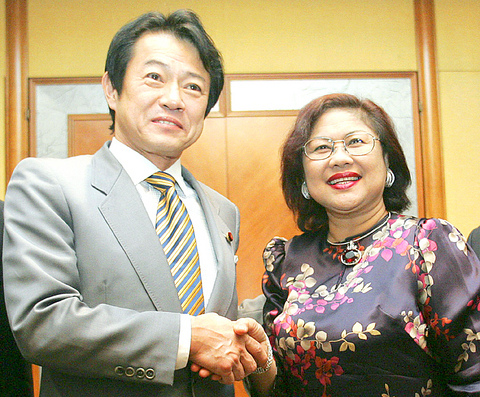Malaysia and Japan yesterday agreed to set up a free trade area (FTA) as part of a comprehensive economic relationship after resolving the last remaining differences in emergency, high-level talks.
"We have now finalized everything," International Trade and Industry Minister Rafidah Aziz told reporters after talks with Japanese Trade Minister Shoichi Nakagawa who arrived earlier yesterday for last-ditch efforts to salvage deadlocked negotiations on a planned free trade area.
"It will be a comprehensive economic framework agreement covering all the areas that we feel we would like to cover," Rafidah said.

PHOTO: AP
Talks between Japan and Malaysia began in Kuala Lumpur on Tuesday but had failed to produce a consensus on tariffs for industrial products, especially in the sensitive auto sector and steel industries of Malaysia, which Japan says is excessively protectionist.
"I have been saying that it is the final stretch that is the most difficult," Nakagawa said. The "trust and confidence" between the two countries had led to this "win-win relationship."
secret compromises
He and Rafidah refused to divulge the details of the compromises made in the auto and steel tariff structures with Nakagawa describing it as "a national secret."
Rafidah said that the comprehensive economic relationship will contain elements of the free trade area, which will be formally launched in December.
"What we have decided today will become the basis for an agreement in principle" that will be announced when Malaysian Prime Minister Abdullah Ahmad Badawi visits Tokyo on May 25-26 for a bilateral visit.
"It covers all areas -- goods, services, even agriculture and economic cooperation," she said.
Since launching the FTA talks in January last year, the two countries have reached a basic accord on agricultural and marine products. But outstanding issues remain, including Malaysia's tentative pledge to fully eliminate tariffs on imported vehicles by 2015. Japan wants an earlier deadline.
Malaysia imposes high import and excise duties on imported cars to protect its national Proton and Perodua cars from competition. The two carmakers jointly control 74 percent of the auto market in Malaysia, Southeast Asia's biggest passenger car market. Tariffs have recently been lowered for cars produced in Southeast Asian countries but other countries still face high barriers.
Japan also wants Malaysia to abolish tariffs on steel products used for vehicles and household appliances. It quoted unidentified Japanese government sources as saying that Malaysia is considering an immediate removal of tariffs for some car models that do not compete with Proton and Perodua.
Tariff variations
Rafidah said the FTA will contain some "early harvest programs," meaning a list of goods on which the tariff abolition and reduction will come into force immediately after the deal is signed in December. Other items will see the benefits of the FTA gradually.
"The mechanism for tariff cutting, tariff abolishment in terms of FTA will start as and when it is scheduled to start."
"Both sides are very happy ... As of now it is done. We are just going to shake hands afterward," she said.

The Taiwanese passport ranked 33rd in a global listing of passports by convenience this month, rising three places from last month’s ranking, but matching its position in January last year. The Henley Passport Index, an international ranking of passports by the number of designations its holder can travel to without a visa, showed that the Taiwan passport enables holders to travel to 139 countries and territories without a visa. Singapore’s passport was ranked the most powerful with visa-free access to 192 destinations out of 227, according to the index published on Tuesday by UK-based migration investment consultancy firm Henley and Partners. Japan’s and

NATIONAL SECURITY THREAT: An official said that Guan Guan’s comments had gone beyond the threshold of free speech, as she advocated for the destruction of the ROC China-born media influencer Guan Guan’s (關關) residency permit has been revoked for repeatedly posting pro-China content that threatens national security, the National Immigration Agency said yesterday. Guan Guan has said many controversial things in her videos posted to Douyin (抖音), including “the red flag will soon be painted all over Taiwan” and “Taiwan is an inseparable part of China,” while expressing hope for expedited “reunification.” The agency received multiple reports alleging that Guan Guan had advocated for armed reunification last year. After investigating, the agency last month issued a notice requiring her to appear and account for her actions. Guan Guan appeared as required,

Japan and the Philippines yesterday signed a defense pact that would allow the tax-free provision of ammunition, fuel, food and other necessities when their forces stage joint training to boost deterrence against China’s growing aggression in the region and to bolster their preparation for natural disasters. Japan has faced increasing political, trade and security tensions with China, which was angered by Japanese Prime Minister Sanae Takaichi’s remark that a Chinese attack on Taiwan would be a survival-threatening situation for Japan, triggering a military response. Japan and the Philippines have also had separate territorial conflicts with Beijing in the East and South China

A strong cold air mass is expected to arrive tonight, bringing a change in weather and a drop in temperature, the Central Weather Administration (CWA) said. The coldest time would be early on Thursday morning, with temperatures in some areas dipping as low as 8°C, it said. Daytime highs yesterday were 22°C to 24°C in northern and eastern Taiwan, and about 25°C to 28°C in the central and southern regions, it said. However, nighttime lows would dip to about 15°C to 16°C in central and northern Taiwan as well as the northeast, and 17°C to 19°C elsewhere, it said. Tropical Storm Nokaen, currently